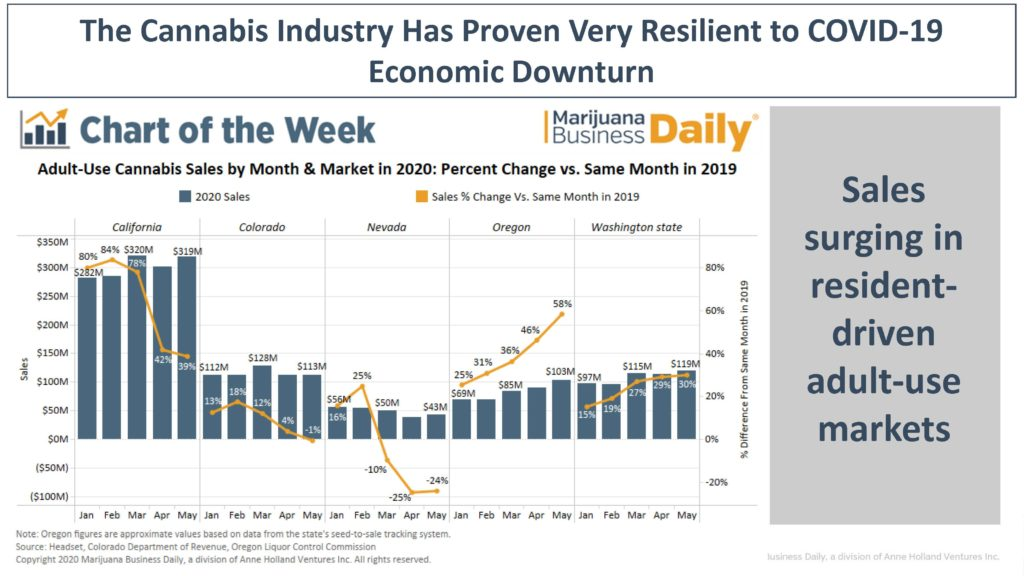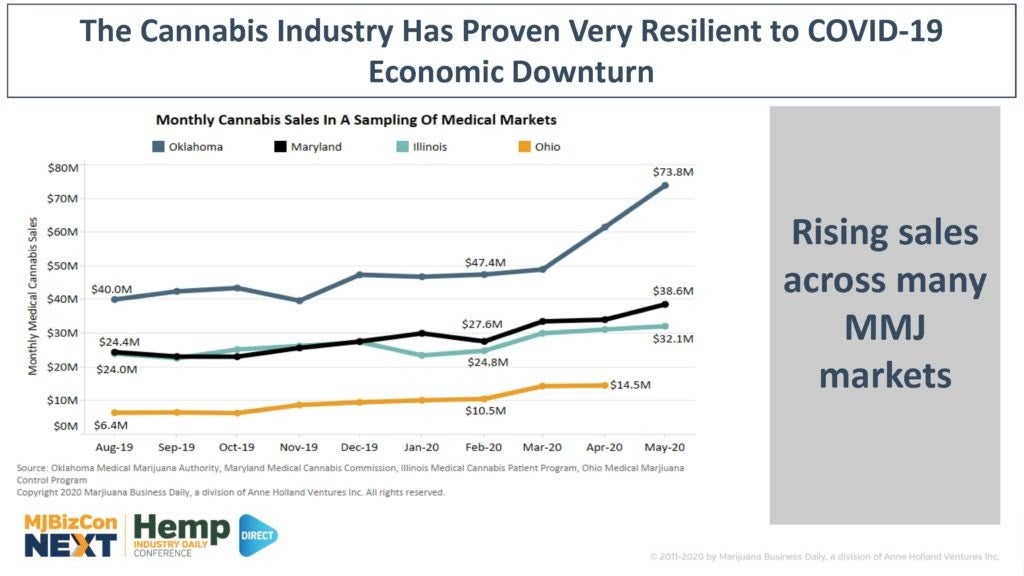The following post was written and/or published as a collaboration between Benzinga’s in-house sponsored content team and a financial partner of Benzinga.
The coronavirus crisis has caused dramatic shifts in how and when consumers spend their money, specifically with regard to consumer products—and cannabis is no different.
Most states allowed cannabis dispensaries to remain open during lockdown, saving the nascent industry from the same fate as the rest of brick-and-mortar retail. But even though cannabis was deemed an essential industry, consumer habits changed nonetheless.
Record Sales, Cost-Conscious Consumers
Perhaps buoyed by that “essential business” label, adult-use cannabis sales in the largest U.S. markets remained relatively resilient compared to other segments of the retail industry.
“What we’ve seen is that the average cart size at retail is going up,” said John Moynan, chief operating officer at SLANG Worldwide SLGWF, a consumer packaged goods (CPG) company with distribution in 12 states. “People are buying more, and the average price per unit is going down, so basically people are bulk buying and looking for more value options.”
Experts agree that bulk buying at the outset of the pandemic was likely the reason for the increase in sales. But five months in, sales are still strong.

Source: Marijuana Business Daily
Even in newer markets like Michigan and Illinois, sales have elevated to the point where several states have set new monthly sales records this summer.

Source: Marijuana Business Daily
By some estimates, COVID-19 has changed the consumption habits of 70% of U.S. cannabis consumers, both regarding how they spend their money and how they consume the plant.
“When stimulus checks started going out, unemployment benefits started going out, that's when you really started seeing the shift, because now people were a little more mindful of their money,” said SLANG President & CEO Chris Driessen. “They were still consuming cannabis, but were a little more discerning about what specifically they were buying.”
Something else to consider is the decentralized nature of the U.S. cannabis industry. So not only are consumer habits changing, but how they change depends on how mature the market is.
“What’s driving consumer purchasing behavior in Oregon may be dramatically different than what's driving it in Colorado just because of the way that the market has evolved in each of those locations over their timeline,” said Moynan.
Long-Term Implications
The relative success of the cannabis industry during the pandemic has brought several key industry questions to the forefront.
On the legalization front, the categorization of dispensaries as essential businesses during a public health crisis is a major step towards federal legalization. Even as Joe Biden has remained steadfast against marijuana decriminalization, Kamala Harris’ support of legalization could mean a Biden-Harris administration would take up the issue.
As it relates to cannabis businesses, Driessen believes that Covid-19 is going to accelerate trends that were already going to take shape, such as an increased value premium on specific brands.
“In pretty much every other mainstream industry, there's a premium that's put on brands,” he said. “A great example in a comparison we often use is Coca-Cola Co KO and 7-Eleven. Traditionally they do roughly the same amount of revenue, but yet one gets almost a 6X multiple on their value and one gets 0.8 multiple. Well, why is that? They're doing the same amount of revenue, but it's because the profit margins are different. 7-Eleven has a lot of operating expenses and a lot of overhead to have that many brick and mortar stores and employees. Coca-Cola just doesn't have that same breadth of operating expense.”
The preceding post was written and/or published as a collaboration between Benzinga’s in-house sponsored content team and a financial partner of Benzinga. Although the piece is not and should not be construed as editorial content, the sponsored content team works to ensure that any and all information contained within is true and accurate to the best of their knowledge and research. This content is for informational purposes only and not intended to be investing advice.
Edge Rankings
Price Trend
© 2025 Benzinga.com. Benzinga does not provide investment advice. All rights reserved.
Trade confidently with insights and alerts from analyst ratings, free reports and breaking news that affects the stocks you care about.
Cannabis is evolving—don’t get left behind!
Curious about what’s next for the industry and how to stay ahead in today’s competitive market?
Join top executives, investors, and industry leaders at the Benzinga Cannabis Capital Conference in Chicago on June 9-10. Dive deep into market-shaping strategies, investment trends, and brand-building insights that will define the future of cannabis.
Secure your spot now before prices go up—this is where the biggest deals and connections happen!